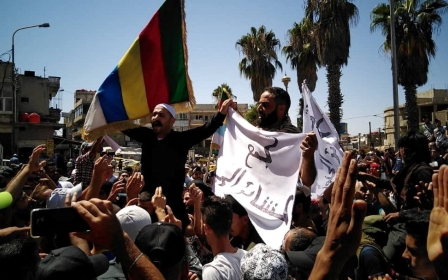US-backed SDF issues 'general amnesty' to rebelling Arab tribes in Syria

The US-backed Syrian Democratic Forces have issued a "general amnesty" to Arab tribal fighters in Deir Ezzor, as it looks to diffuse tensions after days of bloody fighting.
“We have a decision to issue a general amnesty for those involved," SDF commander Mazloum Abdi told Reuters on Thursday.
"We already released half that were arrested, and we will release the rest,” he added.
Fighting broke out in the oil-rich province of Deir Ezzor on 27 August, when the SDF detained Ahmad al-Khabil, better known as Abu Khawla, the controversial head of the Deir Ezzor military council, amid suspicion he was conspiring to oust the US-backed force from the region, MEE previously reported.
Former US officials and Arab tribal leaders told MEE previously that Abu Khawla’s arrest was the spark that ignited fighting motivated by broader local grievances over corruption and political disenfranchisement.
Stay informed with MEE's newsletters
Sign up to get the latest alerts, insights and analysis, starting with Turkey Unpacked
One of the main demands of the tribes was an end to SDF rule and the creation of an independent military council made up of local Arabs that would coordinate security and economic assistance directly with the US.
In his interview with Reuters, Abdi said there were “flaws” in the way local councils had been run. "There are gaps, and there were mistakes on the ground," he said.
The SDF has wrested back control of the territory from the rebelling tribes. Sources within the al-Aqeedat tribe of Deir Ezzor told MEE on Tuesday that Ibrahim al-Hifl, a tribal leader who had become the public face of the fight, fled to Syrian government-controlled territory.
'Arab grievances'
Deir Ezzor is split along the Euphrates River. The US and its allies hold the eastern bank, while Syrian government forces and their Russian and Iranian allies control the west.
The US-backed SDF is a multiethnic Syrian force, but its backbone is the Kurdish People's Protection Units or YPG, a group with ties to the Kurdistan Workers' Party. They fought alongside Arab tribes with US backing to remove the Islamic State militant (IS) group from the region in 2017.
The US warned that fighting between the tribes and SDF distracted from the focus of preventing an IS resurgence. Meanwhile, the Syrian government and its Russian and Iranian backers saw the fight as an opportunity to oust the US from the region.
While some of the Arab tribes work with the SDF and the US, other factions maintain ties to Damascus.
On Sunday, US officials visited the region in an attempt to mediate between the Kurds and Arab tribes.
Senior State Department official Ethan Goldrich and Major General Joel Vowell, who heads the coalition against IS, released a statement saying the two sides agreed to "address local grievances" and "de-escalate violence”.
Robert Ford, a former US ambassador to Syria, previously told MEE that an SDF military victory alone wouldn’t be enough to reduce the tensions, and Arab demands for greater political representation and local governance would need to be addressed.
“The SDF taking Deir Ezzor back by force doesn’t end this. The tribal grievances are still there," he said.
Middle East Eye delivers independent and unrivalled coverage and analysis of the Middle East, North Africa and beyond. To learn more about republishing this content and the associated fees, please fill out this form. More about MEE can be found here.





